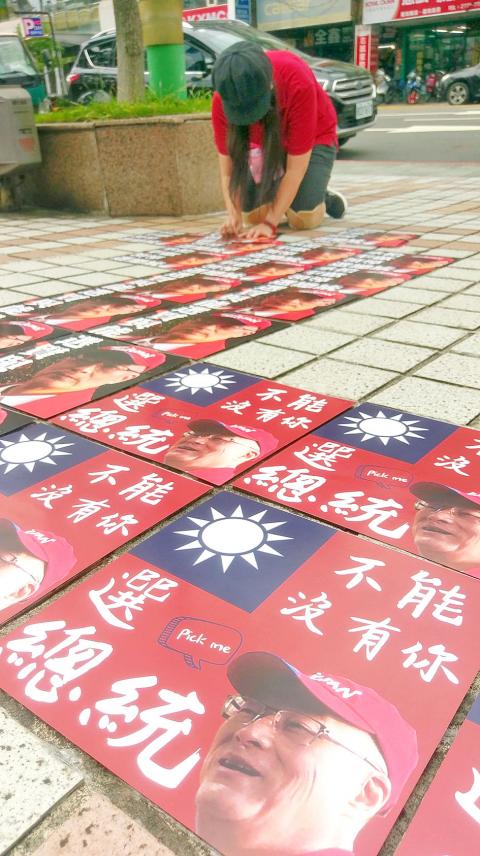The Chinese Nationalist Party’s (KMT) presidential nomination panel yesterday announced a list of five candidates for the party’s presidential primary.
The panel named Kaohsiung Mayor Han Kuo-yu (韓國瑜), Hon Hai Precision Industry Co chairman Terry Gou (郭台銘), former New Taipei City mayor Eric Chu (朱立倫), former Taipei County commissioner Chou Hsi-wei (周錫瑋) and National Taiwan University political science professor Chang Ya-chung (張亞中).
The candidates are to vie for the KMT’s nomination to run in the presidential election in January next year.

Photo: Fang Pin-chao, Taipei Times
They have been invited to attend a meeting at party headquarters today, as well as three platform presentations to be held by the KMT’s National Policy Foundation think tank from late this month to early next month, KMT Vice Chairman Tseng Yung-chuan (曾永權) said at the party’s headquarters in Taipei.
The KMT would conduct landline-based polls from July 5 to 15 to determine the primary’s winner, he said, adding that the poll results would be reviewed by the KMT Central Standing Committee on July 17, before being submitted to a national convention for approval on July 28.
Asked about Gou’s suggestion last week that the KMT devise a backup plan in case the primary’s winner cannot run in the election, Tseng said the party respects Gou’s opinion, but added that the regulations passed by the committee do not require a backup.
At a news conference in Taipei yesterday, Gou again called on the KMT to consider his suggestion and proposed conducting cellphone-based polls.
He would attend today’s meeting, he said, expressing hope that the party would give him and the other candidates a clear answer regarding his suggestions.
Without clear primary regulations to ensure fairness, “what happened with former legislative speaker Wang Jin-pyng (王金平) could happen again,” he said, referring to Wang’s announcement last week that he would forgo the primary.
The KMT has asked the candidates to sign a pledge saying that they will not run for president if they do not win the primary, but Gou said that he has not signed it.
“Why should I sign anything before there are even [clear] primary regulations in place? I urge the other candidates not to sign it either,” he said.
Chu told reporters at an event in New Taipei City that pledging not to run for president unless nominated by the party is a “basic requirement.”
KMT members who are considering running for president, but not as a party member should not join the primary, he added.
Asked at another event in Taipei whether he would attend today’s meeting, Chu said that he would not, citing conflicting travel plans.
Han, when asked in Kaohsiung about Gou’s call not to sign the pledge, said that he respects Gou’s opinions, adding: “I have my own views.”
Asked the same question at a cross-strait forum in Taipei, KMT Chairman Wu Den-yih (吳敦義) said that the candidates do not have to agree to “every word” of the pledge and that its contents can be adjusted.
The candidates can focus on areas they find important, as long as they have “the right spirit” and are in line with the KMT’s principles, he added.

DEFENSE: The National Security Bureau promised to expand communication and intelligence cooperation with global partners and enhance its strategic analytical skills China has not only increased military exercises and “gray zone” tactics against Taiwan this year, but also continues to recruit military personnel for espionage, the National Security Bureau (NSB) said yesterday in a report to the Legislative Yuan. The bureau submitted the report ahead of NSB Director-General Tsai Ming-yen’s (蔡明彥) appearance before the Foreign and National Defense Committee today. Last year, the Chinese People’s Liberation Army (PLA) conducted “Joint Sword-2024A and B” military exercises targeting Taiwan and carried out 40 combat readiness patrols, the bureau said. In addition, Chinese military aircraft entered Taiwan’s airspace 3,070 times last year, up about

A magnitude 4.3 earthquake struck eastern Taiwan's Hualien County at 8:31am today, according to the Central Weather Administration (CWA). The epicenter of the temblor was located in Hualien County, about 70.3 kilometers south southwest of Hualien County Hall, at a depth of 23.2km, according to the administration. There were no immediate reports of damage resulting from the quake. The earthquake's intensity, which gauges the actual effect of a temblor, was highest in Taitung County, where it measured 3 on Taiwan's 7-tier intensity scale. The quake also measured an intensity of 2 in Hualien and Nantou counties, the CWA said.

The Overseas Community Affairs Council (OCAC) yesterday announced a fundraising campaign to support survivors of the magnitude 7.7 earthquake that struck Myanmar on March 28, with two prayer events scheduled in Taipei and Taichung later this week. “While initial rescue operations have concluded [in Myanmar], many survivors are now facing increasingly difficult living conditions,” OCAC Minister Hsu Chia-ching (徐佳青) told a news conference in Taipei. The fundraising campaign, which runs through May 31, is focused on supporting the reconstruction of damaged overseas compatriot schools, assisting students from Myanmar in Taiwan, and providing essential items, such as drinking water, food and medical supplies,

New Party Deputy Secretary-General You Chih-pin (游智彬) this morning went to the National Immigration Agency (NIA) to “turn himself in” after being notified that he had failed to provide proof of having renounced his Chinese household registration. He was one of more than 10,000 naturalized Taiwanese citizens from China who were informed by the NIA that their Taiwanese citizenship might be revoked if they fail to provide the proof in three months, people familiar with the matter said. You said he has proof that he had renounced his Chinese household registration and demanded the NIA provide proof that he still had Chinese